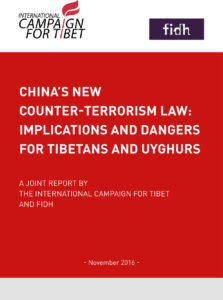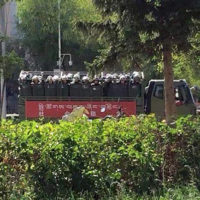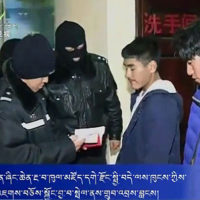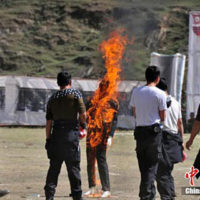Special report by the International Campaign for Tibet (ICT) and FIDH

Download the full report (PDF) »
View the report’s images below.
The International Campaign for Tibet (ICT) and FIDH highlight the serious human rights risks and counter-productive nature of China’s new counter-terrorism law in a new report launched today at the Foreign Correspondents Club of Tokyo, Japan.
The report draws on ICT and FIDH’s analyses of China’s counter-terrorism strategy and legislation, as well as the findings of an international round-table held in June 2016. Experts at this round-table detailed how the Chinese government has sought to legitimize its repressive measures by passing legislation that intensifies the Chinese Communist Party’s control over free expression and broad-ens the scope to suppress dissent in Tibet and Xinjiang.
ICT’s EU Policy Director Vincent Metten said: “The sweeping measures introduced in the new law – which have alarmed governments globally – are focused less on preventing terror and protecting China’s citizens, and more on the elimination of dissent and enforcement of compliance to Communist Party policies. This is likely to heighten tensions and increase the risk of violence by shut-ting down other means of recourse, and it also undermines the legitimacy of genuine international counter-terror efforts. Peace and stability cannot be achieved through hyper-securitization, nor by labelling as a terrorist the Nobel Peace Prize Laureate the Dalai Lama, whose leadership has ensured that Tibetans do not turn to violence in response to oppression.”
In Tibet, despite the absence of any violent insurgency, an aggressive ‘counter-terrorism’ drive has resulted in an expansion of militarization across the plateau. By conflating the expression of distinct religious and ethnic identities with ‘separatism’, and blurring distinctions between violent acts and peaceful dissent, the Chinese government is using counter-terrorism as a justification to crackdown on even mild expressions of religious identity and culture in Tibet and Xinjiang.
“China’s intensifying national security strategy and its new counter-terrorism law will have severe consequences for freedom of expression, association, peaceful assembly and religion in China, which are already sharply curtailed under existing laws and policies,” said FIDH’s Director of Operation, Marceau Sivieude. “Punishing peaceful expression by qualifying any dissent as a threat to national security not only violates international human rights law, but risks increasing tensions and encouraging extremism by closing off all outlets for peaceful expression and dissent.”
China has expressed an interest in cooperating on counter-terrorism initiatives with other countries and inter-governmental agencies, including with EUROPOL. This is an opportunity for governments and international organizations to challenge the risks and human rights violations of China’s new counter-terrorism law, and to insist on a review of the law and China’s overall counter-terrorism strategy. The report published today outlines how and why the law presents a risk to human rights and effective counter-terrorism, and how the Chinese authorities and the international community can address these challenges, in order to ensure that China’s counter-terrorism approach does not result in more violence.
* The new report – China’s new counter-terrorism law: Implications and Dangers for Tibetans and Uyghurs is accessible here (PDF) »
https://savetibet.org/wp-content/uploads/2016/11/FIDH-ICT-Chinas-new-counter-terrorism-law-Implications-and-Dangers-for-Tibetans-and-Uyghurs-15-11-2016-FINAL.pdf
Press contacts:
Kate Saunders
Communications Director
International Campaign for Tibet
Tel: +44 7947 138612
E-Mail: [email protected]
Vincent Metten
EU Policy Director
International Campaign for Tibet
Tel: +32 473 990440
E-Mail: [email protected]
Michelle Kissenkoetter
Director of Asia Bureau
FIDH (International Federation for Human Rights)
Tel: +33-(0)-6-4805-9351
E-Mail: [email protected]
Arthur Manet
Director of Media Relations
FIDH (International Federation for Human Rights)
Tel: +33 6 72 28 42 94
E-Mail: [email protected]
(Click to view full images)
- Troops moving through the streets of Rebkong (Tongren) in Qinghai in July 2015.
- Terrorist Attack Planning – A cartoon by Belgian artist Fifi. (Philippe Sadzot)
- Special forces raiding internet cafes and Tibetan tea shops in Dzoege (Ruo’ergai), Ngaba, the Tibetan area of Amdo on 16 December 2015. (Image from official Chinese TV)
- Sichuan Armed Police Corps engaging in combat exercises on the plateau – Image from the Chinese state media. (Front page of state media Aba Daily, on 25 January 2016)
- Special forces raiding internet cafes and Tibetan tea shops in Dzoege (Ru’ergai), Ngaba, the Tibetan area of Amdo on 16 December 2015. (Image from official Chinese TV – 2)
- Public Security Border Defense Corps Detachment officer in Shigatse, Tibet Autonomous Region, talking to Tibetan Buddhist nuns about scientific knowledge and cultural education according to the article. (Image from the Chinese state media)
- Police techniques for dealing with protestors were demonstrated at the Kardze counter-terrorist military drill in May 2014. (Image from the Chinese state media)
- Police responding to staged protests. (Image from the Chinese state media)
- Newly established security gates with scanning machines at Kumbum for the Monlam prayer festival, which began on February 10, 2014. (Image circulated on social media among exiled Tibetans)
- Monks in a Tibetan area of Qinghai, Malho, depicted in the state media receiving fire extinguishers as part of a new drive connected to self-immolations that have taken place in Tibetan monasteries. (Image from the Chinese state media)
- Massed ranks of troops for prayer ceremony at Kumbum monastery on 10 February 2014. (Image circulated on social media among exiled Tibetans)
- Kardze Party Secretary Hu Changsheng visiting Larung Gar monastery in 2015. (Image from the Chinese state media)
- Drop this Weapon – A cartoon by Belgian artist Fifi. (Philippe Sadzot)
- Drop this Weapon – A cartoon by Belgian artist Fifi. (Philippe Sadzot)
- Counter-terror drill in Kardze (Ganzi), Sichuan, in May 2014. (Image from the Chinese state media)
- As part of a counter-terrorist military drill in Kardze on 26 May 2014, a self-immolation was staged using what is presumably a dummy model. (Image from the Chinese state media)
- Anti-terrorist training in Kardze (Ganzi), Sichuan (the Tibetan area of Kham) in 2007.
- Anti-terrorism Training – A cartoon by Belgian artist Fifi. (Philippe Sadzot)



















